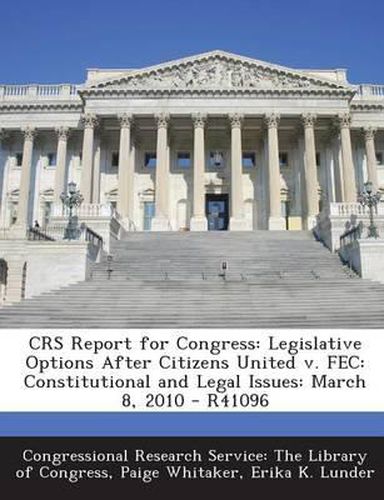Readings Newsletter
Become a Readings Member to make your shopping experience even easier.
Sign in or sign up for free!
You’re not far away from qualifying for FREE standard shipping within Australia
You’ve qualified for FREE standard shipping within Australia
The cart is loading…






In Citizens United v. FEC, the Supreme Court invalidated two provisions of the Federal Election Campaign Act (FECA), finding that they were unconstitutional under the First Amendment. The decision struck down the long-standing prohibition on corporations using their general treasury funds to make independent expenditures, and Section 203 of the Bipartisan Campaign Reform Act of 2002 (BCRA), prohibiting corporations from using their general treasury funds for “electioneering communications.” BCRA defines “electioneering communication” as any broadcast, cable, or satellite communication that refers to a clearly identified federal candidate made within 60 days of a general election or 30 days of a primary. The Court determined that these prohibitions constitute a “ban on speech” in violation of the First Amendment. The Court, however, upheld the disclaimer and disclosure requirements in Sections 201 and 311 of BCRA as applied to a movie regarding a presidential candidate that was produced by Citizens United, a tax-exempt corporation, and the broadcast advertisements it planned to run promoting the movie. As a result of the Court’s ruling, federal campaign finance law no longer restricts corporate or, most likely, labor union use of general treasury funds to make independent expenditures for any communication expressly advocating election or defeat …
$9.00 standard shipping within Australia
FREE standard shipping within Australia for orders over $100.00
Express & International shipping calculated at checkout
In Citizens United v. FEC, the Supreme Court invalidated two provisions of the Federal Election Campaign Act (FECA), finding that they were unconstitutional under the First Amendment. The decision struck down the long-standing prohibition on corporations using their general treasury funds to make independent expenditures, and Section 203 of the Bipartisan Campaign Reform Act of 2002 (BCRA), prohibiting corporations from using their general treasury funds for “electioneering communications.” BCRA defines “electioneering communication” as any broadcast, cable, or satellite communication that refers to a clearly identified federal candidate made within 60 days of a general election or 30 days of a primary. The Court determined that these prohibitions constitute a “ban on speech” in violation of the First Amendment. The Court, however, upheld the disclaimer and disclosure requirements in Sections 201 and 311 of BCRA as applied to a movie regarding a presidential candidate that was produced by Citizens United, a tax-exempt corporation, and the broadcast advertisements it planned to run promoting the movie. As a result of the Court’s ruling, federal campaign finance law no longer restricts corporate or, most likely, labor union use of general treasury funds to make independent expenditures for any communication expressly advocating election or defeat …